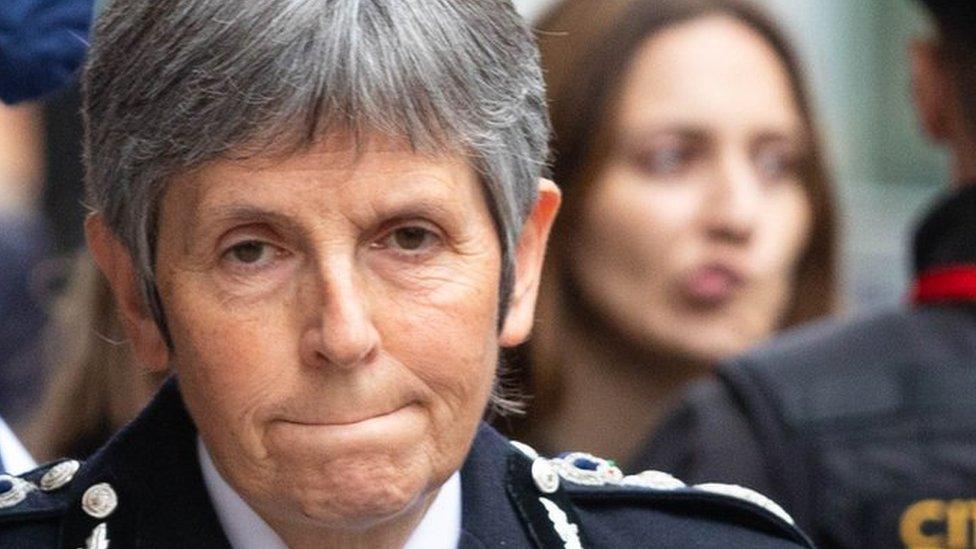Cressida Dick: Sadiq Khan intimidated Met chief into quitting- report
- Published
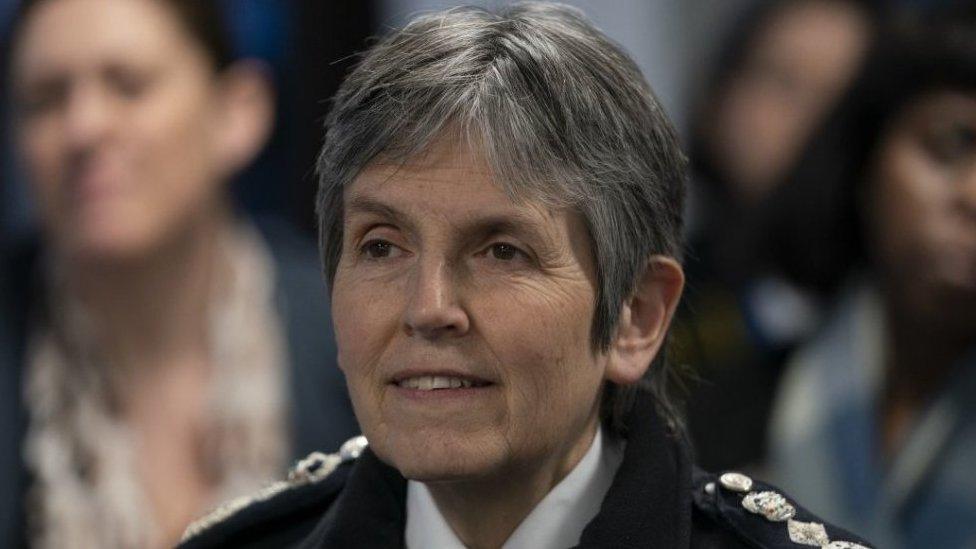
Dame Cressida Dick was the first woman to hold the role of commissioner
Dame Cressida Dick "felt intimidated" into stepping down as Metropolitan Police commissioner after an ultimatum from Sadiq Khan, according to a review.
She quit in February when the mayor of London said he had lost confidence in her leadership.
Sir Tom Winsor's report into the handling of Dame Cressida's exit found that Mr Khan did not follow "due process" when he withdrew his support.
The mayor said the review was "clearly biased" and "ignores the facts".
In February, the Home Secretary Priti Patel asked Sir Tom - the then-chief inspector of constabulary - to look at the circumstances surrounding Dame Cressida's resignation.
Sir Tom's published findings noted that the mayor's actions were "not in accordance with the relevant legislation".
Dame Cressida said the report had found Mr Khan "did not follow due process and at times his behaviour was oppressive, unreasonable, entirely unacceptable and unfair".
The former commissioner previously said she had to resign after Mr Khan made it clear he had no confidence in her leadership.
It followed cases of sexism and misogyny among some Met officers.
Dame Cressida, the first woman to lead the UK's biggest police force, also faced criticism over the murder of Sarah Everard by a serving Met officer last year, and a series of other scandals.
Met Police chief Cressida Dick resigns with "sadness and regret"
In his 116-page report, external, Sir Tom said the mayor had given the commissioner "an ultimatum" to attend a meeting where she would have to convince him about her plans for the force, otherwise he would release a statement "making it clear that he no longer had trust and confidence" and would begin the "statutory process" to remove her.
"When the commissioner did not attend that meeting, the mayor's chief of staff reiterated the mayor's position and gave her less than one hour to decide what to do."
He said she was "intimidated by this process into stepping aside", and "the commissioner felt that, in the interests of Londoners and the Metropolitan Police, she had to 'step aside', as a prelude to her eventual resignation".
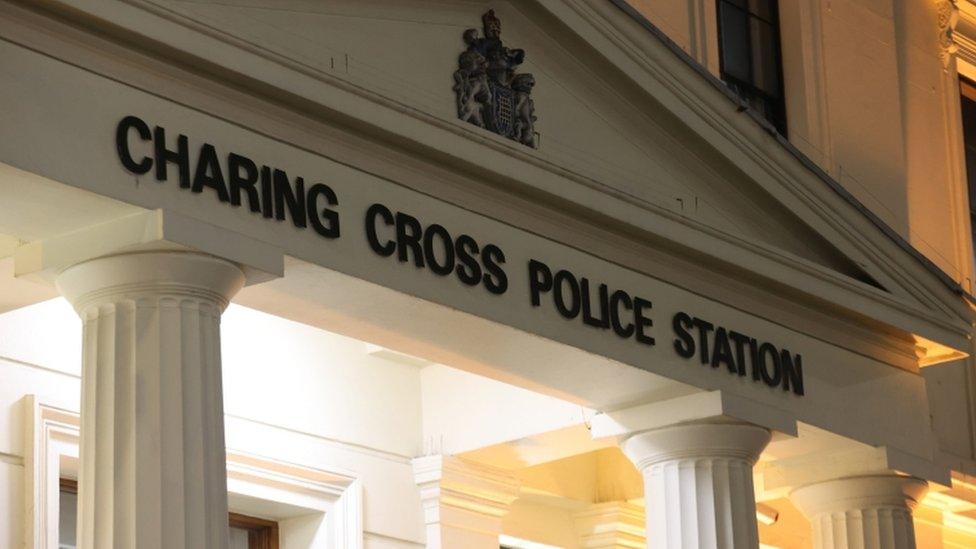
Disturbing messages between officers, based mostly at Charing Cross, were published days before Dame Cressida Dick resigned
The report found that City Hall had given Dame Cressida 30 minutes to make a decision.
Sir Tom also noted that hours before Dame Cressida announced her resignation, communications between the mayor's chief of staff and the Met Police chief of corporate services were "unjustifiably politically brutal".
"For any public servant - least of all one so senior and long-serving - to be given under an hour to decide whether to resign or to challenge the mayor's position was entirely unacceptable."
He described the timetable "imposed" on the commissioner as "wholly arbitrary", adding there had been "no explanation why the commissioner's position had to be publicly resolved in such a short space of time", giving her little time to consult with others.
"The mayor was entirely incapable in interview of explaining why he believed he had to make a public statement on the commissioner's position on the evening of the 10 February, 2022."
Watch London mayor Sadiq Khan's statement on Cressida Dick's resignation
Sir Tom said in his opinion the mayor and the Mayor's Office for Policing And Crime's (Mopac) actions were "oppressive" and "unreasonable".
"The pressure to resign was considerable, and it succeeded," he added.
In June - months after Dame Cressida quit - the Met was placed into an advanced stage of monitoring, in what the home secretary described as "special measures".
Ms Patel said it was clear to her the Met Police was falling short in getting "the basics right".


Analysis
By Daniel Sandford, home affairs correspondent
On the face of it the criticisms of London's mayor Sadiq Khan in this review are devastating.
Sir Tom Winsor says the mayor had effectively "constructively dismissed" the most senior police officer in the UK.
He wrote that his staff had been "unjustifiably politically brutal", that they had imposed a "wholly arbitrary" timetable, and there could be "no justification" for the mayor's "unfair" conduct or his "oppressive and unreasonable treatment" of Dame Cressida Dick.
Sadiq Khan has sought to undermine the review's damage to him by claiming Sir Tom has a history of supporting Conservative Party politicians and policies and is "clearly biased"
It is worth remembering that the reputation of Dame Cressida and the force she was leading were at a very low point in February.
But what is at stake here is whether it should be possible for a politician - either in a fit of pique or for entirely justifiable reasons - to just get rid of a police chief by threatening to publicly undermine them.
Sir Tom has clearly concluded that Parliament has put procedures in place and these should be followed. He says that politicians should have to pay a high political price for circumventing that process as happened on 10 February.

Responding to Sir Tom's report Mr Khan said: "On the former commissioner's watch, trust in the police fell to record lows following a litany of terrible scandals.
"What happened was simple - I lost confidence in the former commissioner's ability to make the changes needed and she then chose to stand aside.
"Londoners elected me to hold the Met commissioner to account and that's exactly what I have done.
"I make absolutely no apology for demanding better for London and for putting the interests of the city I love first. I will continue working with the new commissioner to reduce crime and to rebuild trust and confidence in the police."
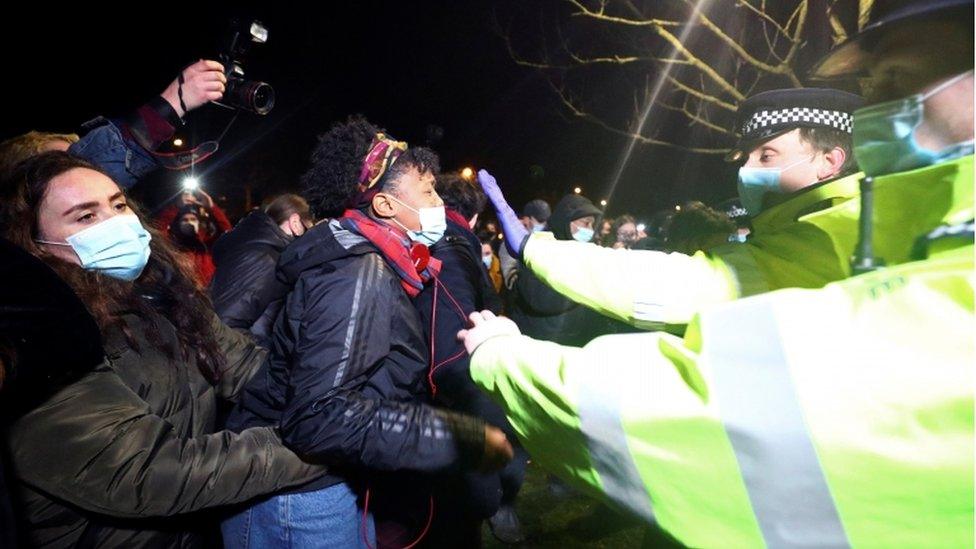
The Met's handling of a vigil following the murder of Sarah Everard was widely criticsed
The circumstances of Dame Cressida's departure were similar to one of her predecessors Sir Ian Blair - who resigned as Met commissioner in 2008 when the then-mayor, Boris Johnson, said he had lost confidence in his leadership, external.
In a statement Dame Cressida said: "I regret this report was necessary but I hope it will help create a sounder foundation for my successors.
"At all times I sought to uphold the law and act ethically and with goodwill, professionalism, openness and trust.
"I fully respect the need for democratic oversight of policing. It is also important that politicians respect due process and do not break the rules.
"I hope this report is an opportunity for others to reflect on how City Hall functions and is held to account."
'Speak truth to power'
In a statement the Home Office defended Sir Tom's findings.
A spokeswoman said: "He has never been afraid to speak truth to power and he upholds the highest standards of integrity when it comes to reporting the facts.
"He was hired to deliver a report on the facts surrounding the departure of the commissioner and he has done just that."

Follow BBC London on Facebook, external, Twitter , externaland Instagram, external. Send your story ideas to hellobbclondon@bbc.co.uk, external
- Published28 March 2022
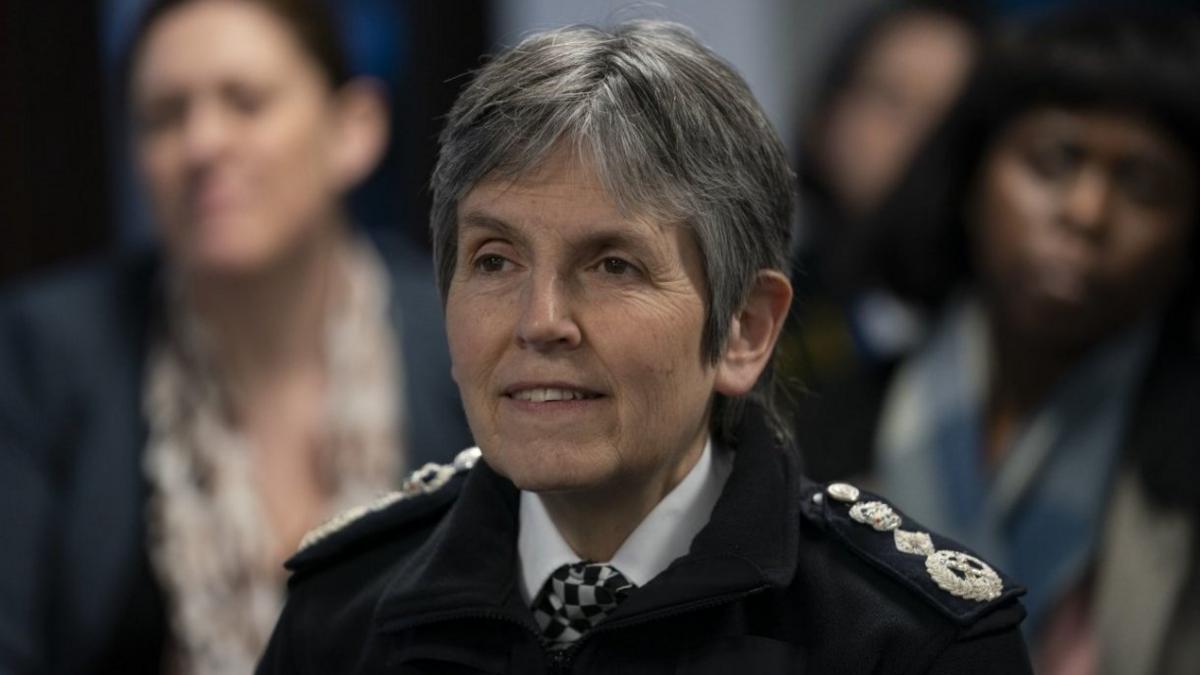
- Published11 February 2022
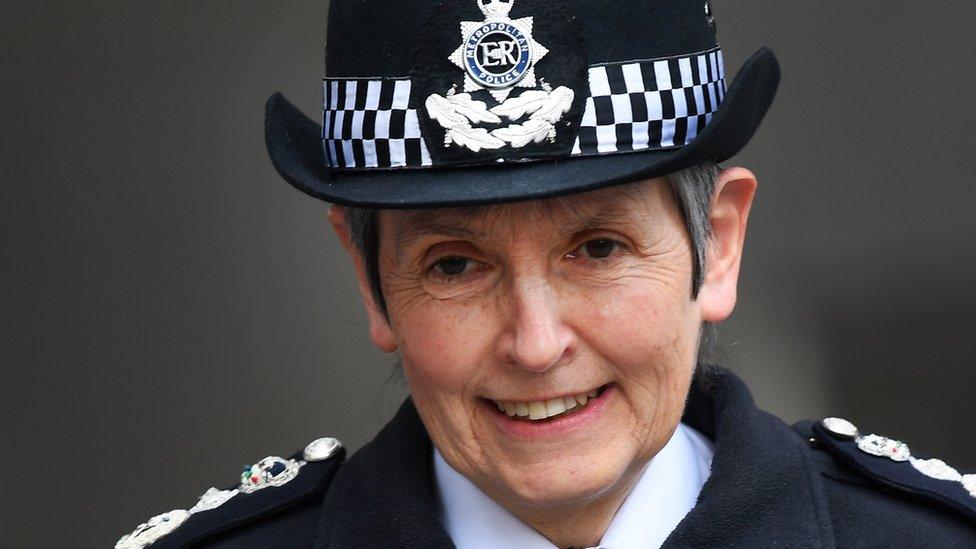
- Published11 February 2022
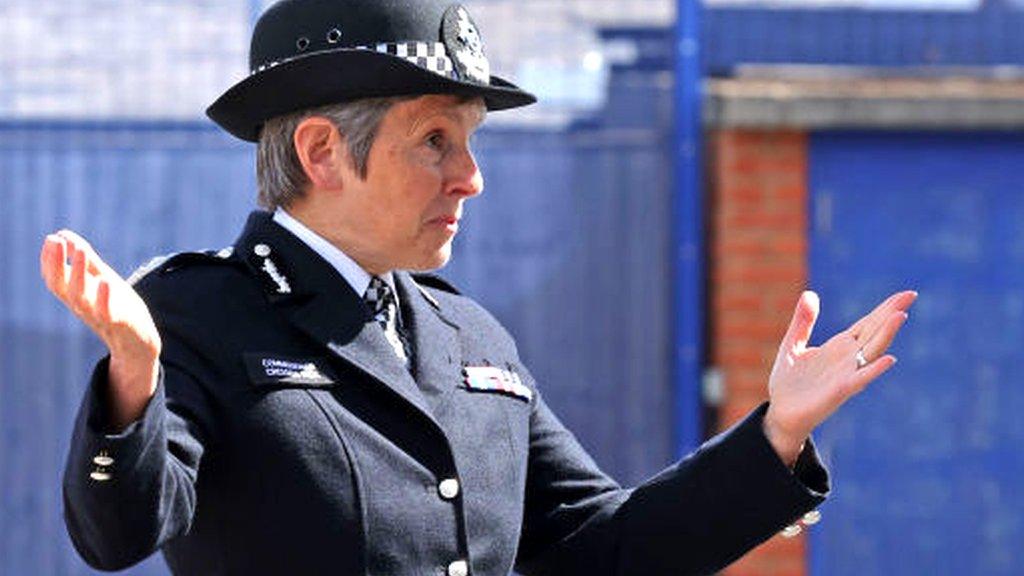
- Published12 February 2022
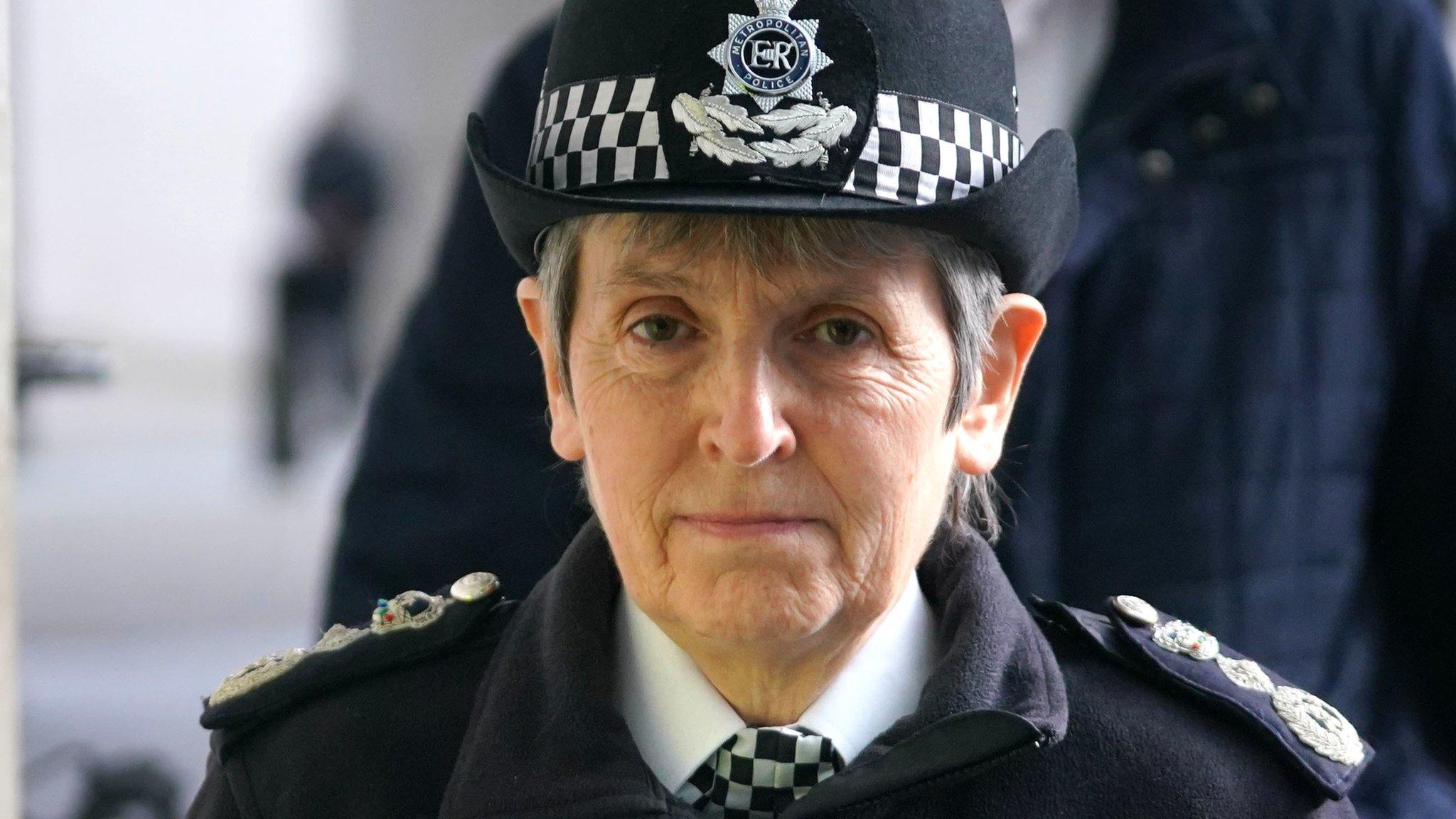
- Published10 February 2022
